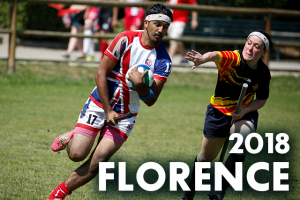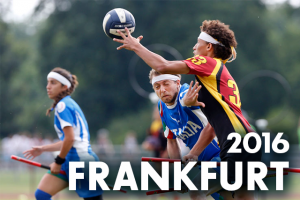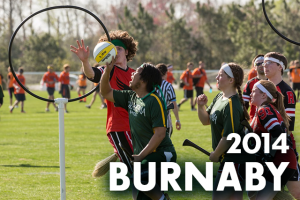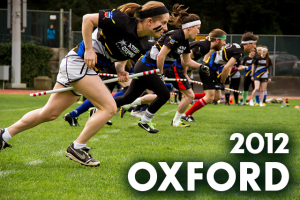IQA World Cups
Quidditch is the most loved and watched sport in the world of Harry Potter. The sport is played by two teams of seven people (three Chasers, two Beaters, one Keeper, and one Seeker) and involves three different types of balls (a Quaffle, two Bludgers, and a Golden Snitch). To learn more about Quidditch, go to Quidditch Through the Ages.
Quidditch is so popular that the sport has even been adapted for the Muggle world, with hundreds of teams competing around the world and watched by thousands of fans. This Muggle version of the sport has even been featured in both television and film. The International Quidditch Association governs the Muggle version of this sport.
- Austin Outlaws Win Benepe Cup Again - The last season of Major League Quidditch is over. Learn who played the final games and why this was technically the last season.
- IQA Accused of Being Eurocentric While Announcing the Dates of IQA World Cup in USA - An anonymous author's op-ed explains why the US and Canada didn't join the IQA Pan-American Games and claims the IQA is Eurocentric.
- IQA Changes Tackling Rules, Doesn’t Change Gender Rule - The IQA has announced the results of its proposals for new quidditch rules. Only one of them didn't pass despite support from within the community.
About the IQA
The International Quidditch Association (IQA) represents hundreds of club quidditch teams within more than two dozen national governing bodies. This association works in various areas regarding the Muggle quidditch world, anywhere from organizing international competitions to improving the official rule book.
Website Facebook Twitter Instagram
Xander Manshel and Alex Benepe created Muggle quidditch in 2005 at Middlebury College. Intramural games became regular, and in 2007, they played the first official match.
The sport became international in 2008, when the first non-US team, a Canadian team from McGill University of Quebec, debuted in the first World Cup championship. As the sport gained popularity, it was decided that more formal leadership was needed. As a result, the IQA was created in 2010.
Finland joined the US and Canada in 2011 for World Cup V. Over 10,000 fans came to watch this tournament, where 96 teams performed in New York City.
2012 saw the first bi-annual Global Games, which had teams from the US, Canada, the UK, France, and Australia perform in Oxford, England. This event sparked interest and growing popularity of the sport all around the world.
In 2014, the IQA changed the names of the tournaments, thus renaming the previously held "World Cups" into "US Cups" and starting off the series of bi-annually World Cups, held around the world with teams competing from all around the world.
In 2020, Bex Lowe, team manager for UK Quidditch, started the Amazonian Quidditch League, the first quidditch league exclusively for female, trans, and non-binary players. To help players develop as individuals, the league also hosts expert-led workshops and drills.
The pitch is rectangular with rounded corners: 55 meters (60 yards) by 33 meters (36 yards). Three hoops of varying heights are at either end. The game is over when the snitch is caught, and the team with the most points at the end wins the game.
Each match begins with six of the starting players (excluding the seekers) along the starting line within their keeper zone with brooms on the ground and the four balls lined up in the center of the pitch. The head referee then calls "Brooms up!" at which point players mount their brooms and run to gain possession of the balls, which are lying in the middle of the field, similar to dodgeball.
To be mounted on the broomstick means that the player must hold the broom between their legs and not have it fully on the ground. It can be supported by their thighs or hands equally, just as long as it is not attached to their person or fully resting on the ground.
After "Brooms up" is called, the seekers must not interfere with other positions and wait near the pitch until the end of the seeker floor, which ends after 18 minutes. The snitch runner goes on the field at 17 minutes, and the seekers are released at 18 minutes. All players need to be touching their brooms at all times with one hand.
A team lineup is similar to the magical version of this Muggle game:
- 1 keeper, who tries to guard the goals and can act as a fourth chaser, with special rights in their respective goal zone. The keepers wear green headbands.
- 3 chasers, who try to pass the quaffle (a slightly deflated volleyball) and score goals through the hoops. Goals can be scored from both sides. Each goal is worth 10 points. The chasers wear white headbands.
- 2 beaters, who use the three bludgers (slightly deflated dodgeballs) to hit the other players on the field. A player who has been hit by a bludger will need to dismount their broom, drop the quaffle if they are currently holding it, touch a hoop on their side of the pitch, and mount their broom again to get back into the game. The beaters wear black headbands.
- 1 seeker, who tries to catch the snitch before the other seeker does in order to end the game. The snitch is worth 30 points. The seekers wear yellow or golden headbands.
A snitch is a tennis ball in a sock hanging out of the shorts of a person wearing yellow or gold clothes who is called the snitch runner. The seekers will try to catch the snitch since this ends the game and awards their team 30 points. The latest rules issued three handicaps for the seekers and the snitch runner: Once the seekers are released, the snitch runner must remain between the two keeper zones. If the snitch has not been caught at the 23-minute mark, the first handicap is issued, requiring the snitch runner to stay within 1.5 yards of the middle of the pitch. The second handicap, at 28 minutes, constrains the snitch runner to keep one arm behind their back; the third and final one, at 33 minutes, restricts the snitch runner to within 1.5 yards of the intersection of the middle of the pitch and the sideline opposite the scorekeeper and benches.
Quidditch is coed and just like its magical version, a very brutal sport.
Depending on the severity of the foul, a player found committing an illegal play will be given a blue, yellow, and/or red card. Cards are issued at the discretion of the head referee.
When a blue card is issued, it is considered to be a non-stacking yellow card and can either result in being sent back to the hoops or spending one minute in the penalty box. When a yellow card is issued, the player must sit in the penalty box for one minute. If the opposing team scores before the minute is up, then the player will be allowed to return to the game. They are still considered off the broom and must tag their team's hoops in order to resume play. If a player receives two yellow cards, then the card will become red. If a player receives a red card, that player must sit in the penalty box for two minutes. When a red card is given, that player must sub out for another player. The player coming onto the pitch will then serve two minutes within the penalty box. Both teams are required to have a keeper on the pitch at all times. Therefore, if a keeper has been given a red card, they must give their headband to another chaser on their team.
The IQA serves over three dozen national governing bodies. You can find your local organization here:
- Argentina
- Australia
- Austria
- Belgium
- Brazil
- Canada
- Catalonia
- Chile
- Czechia
- Denmark
- France
- Germany
- Ghana
- Hong Kong
- Ireland
- Italy
- Japan
- Malaysia
- Mexico
- Netherlands
- New Zealand
- Norway
- Pakistan
- Peru
- Poland
- Portugal
- Slovakia
- Slovenia
- South Korea
- Spain
- Sweden
- Switzerland
- Turkey
- Uganda
- United Kingdom
- United States
- Vietnam
Argentina
Asociación Quidditch Argentina (Argentine Quidditch Association)
The Argentine Quidditch Association is a full member of the IQA but has yet to compete in an IQA World Cup.
Australia
Quidditch Australia
Quidditch Australia made its debut in the 2012 IQA World Cup. It has won once: 2016.
Website Facebook Twitter Instagram YouTube
Austria
Quidditch Austria
Quidditch Austria made its debut in the 2016 IQA World Cup.
Belgium
Belgian Quidditch Federation
The Belgian Quidditch Federation made its debut in the 2014 IQA World Cup.
Website Facebook Twitter YouTube
Brazil
Associação Brasileira de Quadribol (Brazilian Quidditch Association)
The Brazilian Quidditch Association made its debut in the 2016 IQA World Cup.
Canada
Quidditch Canada
Quidditch Canada made its debut in the 2012 IQA World Cup.
Catalonia
Associació de Quidditch de Catalunya (Catalonian Quidditch Association)
The Catalonian Quidditch Association made its debut in the 2016 IQA World Cup.
Chile
Asociación Chilena de Quidditch (Chilean Quidditch Association)
The Chilean Quidditch Association is an associate member of the IQA but has yet to compete in an IQA World Cup.
Czechia
Česká Asociace Famfrpálu (Czech Quadball Association)
The Czech Quadball Association made its debut in the 2018 IQA World Cup.
Website Facebook Instagram YouTube
Denmark
Dansk Quidditchforbund (Danish Quidditch Association)
The Danish Quidditch Association is an associate member of the IQA but has yet to compete in an IQA World Cup.
France
Fédération du Quidditch Français (French Quidditch Federation)
The French Quidditch Federation made its debut in the 2012 IQA World Cup.
Website Facebook Twitter Instagram YouTube
Germany
Deutscher Quidditchbund (German Quidditch Federation)
The German Quidditch Federation made its debut in the 2016 IQA World Cup.
Ghana
Ghana Quidditch Association
The Ghana Quidditch Association is an area of interest for the IQA.
Hong Kong
Hong Kong Quidditch Association
The Hong Kong Quidditch Association made its debut in the 2018 IQA World Cup.
Website Facebook Instagram LinkedIn
Ireland
Quidditch Ireland
Quidditch Ireland made its debut in the 2016 IQA World Cup.
Italy
Associazione Italiana Quidditch (Italian Quidditch Association)
The Italian Quidditch Association made its debut in the 2016 IQA World Cup.
Website Facebook Twitter Instagram YouTube
Japan
Japan Quidditch Association
The Japan Quidditch Association is an associate member of the IQA but has yet to compete in an IQA World Cup.
Malaysia
Quidditch Malaysia
Quidditch Malaysia made its debut in the 2018 IQA World Cup.
Mexico
Quidditch México
Quidditch México made its debut in the 2014 IQA World Cup.
Netherlands
Quidditch Nederland (Netherlands Quidditch Association)
The Netherlands Quidditch Association made its debut in the 2016 IQA World Cup.
Website Facebook Twitter Instagram LinkedIn
New Zealand
Quidditch New Zealand
Quidditch New Zealand made its debut in the 2018 IQA World Cup.
Norway
Norges Rumpeldunkforbund (Norwegian Quidditch Association)
The Norwegian Quidditch Association made its debut in the 2016 IQA World Cup.
Website Facebook Instagram YouTube
Pakistan
Quidditch Pakistan
Quidditch Pakistan is an area of interest for the IQA.
Peru
Federación Deportiva Peruana de Quidditch (Peruvian Quidditch Sports Federation)
The Peruvian Quidditch Sports Federation is a full member of the IQA but has yet to compete in an IQA World Cup.
Website Facebook Twitter Instagram LinkedIn
Poland
Polska Liga Quidditcha (Polish Quidditch League)
The Polish Quidditch League made its debut in the 2016 IQA World Cup.
Portugal
Quidditch Portugal
Quidditch Portugal is an area of interest for the IQA.
Slovakia
Slovenská Metlobalová Asociácia (Slovak Quidditch Association)
The Slovak Quidditch Association made its debut in the 2016 IQA World Cup.
Slovenia
Quidditch Zveza Slovenije (Quidditch Association of Slovenia)
The Quidditch Association of Slovenia made its debut in 2016 IQA World Cup.
South Korea
Quidditch Korea
Quidditch Korea made its debut in the 2016 IQA World Cup.
Spain
Asociación Quidditch España (Spanish Quidditch Association)
The Spanish Quidditch Association made its debut in the 2016 IQA World Cup.
Sweden
Svenska Quidditchförbundet (Swedish Quidditch Association)
The Swedish Quidditch Association is an associate member of the IQA but has yet to compete in an IQA World Cup.
Switzerland
Schweizerischer Quidditchverband (Swiss Quidditch Association)
The Swiss Quidditch Association made its debut in the 2018 IQA World Cup.
Turkey
Quidditch Derneği (Quidditch Association in Turkey)
The Quidditch Association in Turkey made its debut in the 2016 IQA World Cup.
Website Facebook Twitter Instagram YouTube
Uganda
Quidditch Uganda
Quidditch Uganda is an associate member of the IQA but has yet to compete in an IQA World Cup.
United Kingdom
QuidditchUK
QuidditchUK made its debut in the 2012 IQA World Cup. Nationally, it also hosts the British Quidditch Cup.
Website Facebook Twitter Instagram YouTube
United States
US Quadball
US Quadball made its debut in the 2012 IQA World Cup. It has won thrice: 2012, 2014, and 2018. Nationally, it also hosts the US Quadball Cup.
Website Facebook Twitter YouTube
Vietnam
Vietnam Quidditch Association
The Vietnam Quidditch Association made its debut in the 2018 IQA World Cup.






